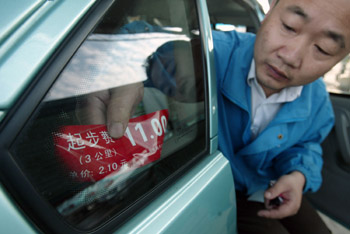SHANGHAI: Taxi passengers in Shanghai started to feel the pinch of soaring
fuel prices yesterday as the city began to roll out its first taxi fare hike
since 1998.

A taxi driver changes the label of the taxi
fare in Shanghai May 11, 2006. The price of riding a taxi rises in
Shanghai, the Shanghai Price Bureau announced Wednesday.
[Reuters] |
The price hike, based on the petrol price gains, is expected to bring relief
to the city's 45,000 cabbies, according to the Shanghai Price Bureau. In
addition, local taxi companies will also lower leasing fees charged on taxi
drivers so as to shoulder part of the rise in fuel costs.
The work to adjust the meters on the city's 45,000 taxis started yesterday
and will be completed by the end of this month.
The flag-fall price in downtown, which covers the first 3 kilometres of a
trip, has risen to 11 yuan (US$1.35) from 10 yuan (US$1.23) during the daytime.
And the price after 11 pm will climb to 14 yuan (US$1.73) from 13 yuan
(US$1.60).
Meanwhile, charges on each additional kilometre will edge up 0.1 yuan (1 US
cent) from the existing 2 yuan (25 US cents), according to the bureau.
In the suburban area, a taxi passenger now pays 9 yuan for the first 3
kilometres, compared with 8 yuan (US$1) previously. And the charges on each
additional kilometre will also increase 0.1 yuan (1 US cent).
Taxi passengers will now pay 1.4 yuan (17 US cents) more for each trip on
average and the local price bureau said the average rise in the cost of a
journey would be about 6.7 per cent.
Local authorities also say they will step up efforts to clamp down on
unlicensed taxis, which are competing with licensed ones in the suburbs.
The taxi fare rise comes after the central government decided to establish a
new mechanism in March, which allows taxi fares to float with fuel prices
changes.
Crude oil prices have increased in recent years and this in turn has pushed
up petrol prices. The type of petrol most frequently used by taxi drivers has
risen by more than 30 per cent compared with last March.
Presently, fuel costs account for more than 30 per cent of a taxi's
operational costs in Shanghai.
Local authorities started to pay fuel subsidies to taxi drivers from last
August. The current 800-yuan (US$100) subsidy for each car will be scrapped
after the price hike.
"The adjustment may partly offset the increase in fuel costs," said Shi
Lizhong, a taxi driver with the Shanghai Dazhong Taxi Company.
According to Shi, a taxi driver may earn 600 yuan (US$75) more thanks to the
price adjustment and few passengers will be affected this time as the adjustment
is still moderate.
In addition, cab companies will charge less on the leasing fees. Currently
the monthly leasing fee is around 9,800 yuan (US$1,200) per car, with some
companies charging 12,000 yuan (US$1,480). The local price bureau has set up a
ceiling price of 9,500 yuan (US$1,171) per month.
While some taxi drivers appeared satisfied with the new adjustment, others
are concerned with the prospect of future fare hikes, which may lead to a fall
in customers.
According to the price bureau, taxi fares will be adjusted each year according
to fuel price fluctuations. Similar taxi fare adjustments will be carried out in
Beijing soon. At a public hearing held last month, 56 per cent of attendees
agreed on a taxi fare increase proposed by the Beijing Municipal Transportation
Bureau.
However, it reported many taxi drivers in Beijing were opposed to the new
pricing plan for fear the rising fares will turn more customers away to
unlicensed cabs, estimated at 72,000, compared to 66,000 licensed ones.
(China Daily 05/12/2006 page3)